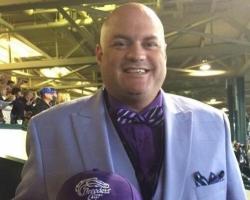When it was determined that Songbird did, in fact, lose by the slightest of margins to three-time Breeders’ Cup champion Beholder in this year’s epic B.C. Distaff, her early legacy was not swept away like that of her perfect record.
Even in defeat, Songbird is still a magnificent filly, who could conceivably run the table in her four year old campaign, then retire with only this singular career loss.
The history of sports is littered with instances of stellar performers who suffered only one defeat, but did so in such iconic fashion that the loss itself was overshadowed by their respective historical greatness.
In horse racing, one need not look any further than the great Zenyatta, who won nineteen of her twenty career starts, with her only “blemish” being her loss to Blame in the 2010 Breeders’ Cup Classic — the final start of her illustrious career.
Jockey Mike Smith piloted both Songbird and Zenyatta in these Breeders’ Cup moments for the ages, losing by a nostril on Friday, and by a head on Nov. 6 at Churchill Downs six years ago.
While Zenyatta did not end her career a perfect 20-for-20, her lone defeat did nothing to mar her image of greatness.
Other instances of one-loss performers who were defeated in iconic fashion:

Many credit — or blame — wide receiver David Tyree for the New England Patriots loss to the New York Giants in Super Bowl XLII (AP Photo/Gene Puskar).
2007 New England Patriots
In what many refer to as the “David Tyree Super Bowl,” due to the “helmet catch,” the New England Patriots were denied a perfect season when the New York Giants defeated them in Super Bowl XLII on February 3, 2008.
Trying to become only the second NFL team to cap off a perfect regular season with a Super Bowl victory, the Patriots were two minutes and forty-two seconds from perfection after quarterback Tom Brady found Randy Moss in the end zone to take a 14-10 lead late in the fourth quarter.
But the Giants’ game-winning drive following the ensuing kickoff on that Sunday in Glendale, Arizona is arguably one of the greatest post-season scoring drives in NFL history.
Having already converted on fourth down deep in their own territory, the Giants faced third down and five yards to go when quarterback Eli Manning inexplicably escaped being sacked by not one… not two… but three Patriot defenders. He then threw the ball to wide receiver David Tyree, who was well-covered by Patriots safety Rodney Harrison. The throw being high, Tyree made an improbable one-handed leaping catch, using his helmet to secure the ball in what is definitely one of the greatest single plays in Super Bowl history.
The Giants would score the game-winning points on a Manning-to-Plaxico Burress 13-yard touchdown pass with thirty five seconds left to play.
Although New England’s shot at immortality was vanquished, they have won four Super Bowl titles this century, reaching the Super Bowl six times.

Barry Switzer (photo via www.sciencepole.com).
1971 Oklahoma Sooners
The 1971 Oklahoma Sooners football team led the nation in scoring and total yards while setting an NCAA record for rushing yards with an average of 472.4 yards per game for head coach Chuck Fairbanks, thanks to offensive coordinator Barry Switzer’s wishbone offense.
The Sooners were stacked with All-Americans, including running back Greg Pruitt, who still holds the single-season record of average yards per rushing attempt with 8.98 yards per carry.
The team steamrolled their first nine opponents, including five nationally-ranked teams before the #2 Sooners hosted defending national champion #1-ranked Nebraska in what was dubbed the “Game of the Century.”
Played on Thanksgiving Day at Owen Field, the game featured back-and-forth scoring, starting with eventual Heisman Trophy winner Johnny Rodgers returning a punt 72 yards for a Cornhuskers touchdown.
With two minutes left in the game, Nebraska would make the final score 35-31 in favor of the Cornhuskers following a Jeff Kinney touchdown plunge. The Sooners were stopped on their final drive when quarterback Jack Mildren was sacked on third and fourth down, sending the Norman crowd home dejected.
The Sooners would go on to win their Big Eight season finale, as well as defeating #5 Auburn in the Sugar Bowl in New Orleans to finish the season 10-1.
Switzer would replace Fairbanks following the 1972 season, only to lead Oklahoma to National Championships in 1974, 1975, and 1985. The team was a force to be reckoned with for two decades.

Some have credited Larry Bird (left) and Magic Johnson (right) with rejuvenating the NBA in the 1980s (photo via NBA.com).
1978-1979 Indiana State Sycamores
Led by NBA Hall of Famer Larry Bird, the 1979 Indiana State Sycamores went undefeated during the regular season, sweeping the Missouri Valley Conference under head coach Bill Hodges.
Ranked #1 in both the AP and national coaches’ poll, the Sycamores advanced to the Final Four in the 1979 NCAA tournament, only to face Earvin “Magic” Johnson and Michigan State in the championship game after defeating DePaul 76-74 in Indiana State’s semifinal game.
Played at the Special Events Center in Salt Lake City, Utah, the game is still the most-watched college basketball game in television history, as Jud Heathcote’s Spartans were heavily-favored over an Indiana State team that played much weaker competition throughout the season.
The very-anticipated showdown between Bird and Magic would be a close contest until about ten minutes remained in the second half with Michigan State leading 52-46. But the Spartans, led by Johnson and fellow NBA first-round selection Greg Kelser, took control, securing Michigan State’s first National Championship by a final score of 75-64.
Finishing the season 33-1, Indiana State’s 1978-79 campaign will live on in infamy, while the Larry Bird vs. Magic Johnson rivalry would dominate the NBA in the 1980s. Even in defeat, the Sycamores seemingly-improbable run will stand the test of time, much like Songbird’s narrow defeat to Beholder.



